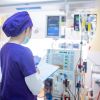“I’m encouraged by how medicine and research are moving together internationally”
Marylyn Addo, the infectiologist from Hamburg, has always relied on international exchange in research.

Marylyn Addo knows what harm viral diseases can cause. The researcher regularly stands at patients’ bedsides as a doctor at the Medical Center Hamburg-Eppendorf (UKE). That was a condition she made when she took on the professorship for emerging infections at UKE in 2013: in addition to her work in the laboratory, she wanted to spend two days a week with patients. As she explains: “Many of my research questions result from working with patients.” She was particularly pleased when a woman who had been flown in from France with a severe COVID-19 infection was eventually allowed to return home again in good health.
France was also where she discovered her interest in infectiology. In the 1990s, while she was a medical student spending a semester abroad, she worked in an AIDS ward there and learned more about the social aspects of the disease. After studying in Bonn, Strasbourg and Lausanne and working at institutes of virology and vaccine research in London and Boston, in Hamburg she has focused on vaccine development.
“We’ve already been able to learn a great deal from earlier pandemics,” says Addo. To a certain extent, the Ebola crisis represented a breakthrough in disease control, because for the first time researchers from all over the world worked together and developed a vaccine in a very short space of time. It was Marylyn Addo who gave a volunteer the first injection and managed the clinical test phase. Soon afterwards the vaccine was approved and was able to protect large sections of the population in Congo.
Genetic data on the coronavirus became available soon after the outbreak in Wuhan. Once again researchers from all over the world set about developing a vaccine – including the Dessau-based company IDT Biologika with the German Center for Infection Research (DZIF) and UKE with Marylyn Addo as investigator. Although the vaccine proved to be well tolerated, it was not sufficiently effective. There’s still some troubleshooting to do, says Addo.
You would like to receive regular information about Germany? Subscribe here:


